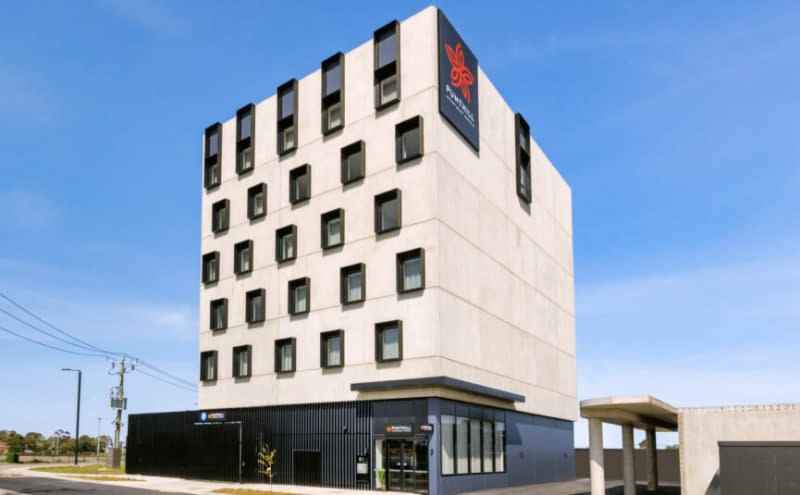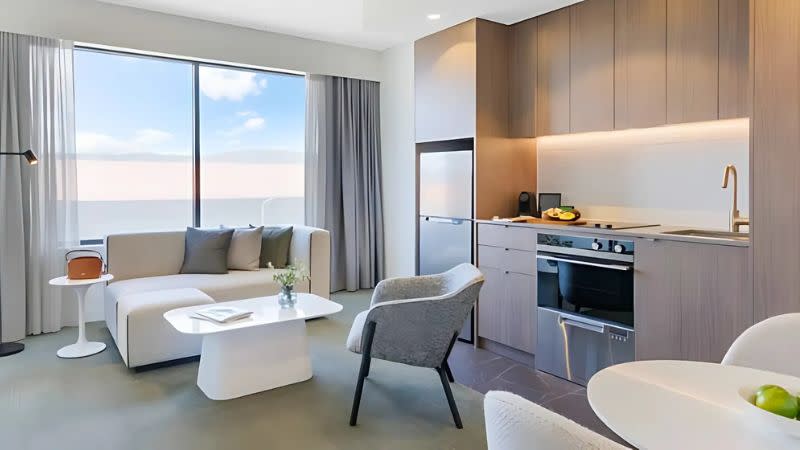Resources
Newsletter
Stay up to date and with the latest news, projects, deals and features.
Subscribe
An office-to-hotel adaptive reuse project has opened its doors to guests in the national capital.
The hotel, operated by the Veriu Group under its Punthill brand, is in Canberra’s Greenway.
The project is the hotel operator’s first in the ACT and third Punthill hotel to open in the past three months.
The hotel is in the former Tuggeranong Innovation Centre Office Precinct at 205 Anketell Street, Greenway, 22km south of the Canberra city centre, and one of the city’s major commercial and government hubs.
Under the conversion, Veriu has created a 76-key apartment hotel with a mix of studio, one, two and three-bedroom units.
Each apartment has a kitchen and laundry facilities.
Short-stay hotels are a popular asset in the city due to business travellers visiting the capital for government work, conferences and corporate events.
The site is near Services Australia, the Australian National University, the Canberra Hospital, Questacon, the Caroline Chisholm Centre and several transpot hubs.
Veriu chief executive Zed Sanjana said the company was focussing on such conversions of underused office space because the ability to work from home has changed attitudes and expectations permanently.
“With a permanent shift towards working remotely post-pandemic, there’s been a significant reduction in the demand for office space,” Sanjana said.
“That’s resulted in a steady increase in Australia’s national office vacancy rate as the supply of space, much of it baked in through new development, has outpaced demand—in turn leading to massive reductions in office values.
“This has created significant pressure on owners of B and C-grade office buildings in most states and territories, who are struggling to compete against newly constructed A-grade office buildings with modern facilities and tenant amenities.”

That leaves office owners with the choice of selling their buildings or reinvesting to compete with other office assets for future tenant income.
Sanjana said this was an opportunity for Veriu—developers like the long-term lease model and partnering with Veriu allows them to invest in a different asset class.
“For owners of B and C-grade buildings considering the significant capex and lease incentive requirements to compete with A-grade buildings, the chance to reinvest in a different asset class managed by a hotel operator like Veriu ... is an increasingly compelling proposition,” Sanjana said.
“Readapting existing underutilised office space in prime locations also presents significant upside for us, as it allows developers to minimise construction costs (as compared to new builds) and complete projects much more quickly in markets where we’ve identified growing demand for quality CBD and suburban assets.”
While Punthill Tuggeranong is the first office-to-hotel conversion for Veriu, the second is in train—Veriu Adelaide on King William Street in the Adelaide CBD is scheduled to open next year.
The operator also has at least four other CBD office conversion opportunities in the pipeline.

But not every office building is right for conversion.
“Our main driver is location—we’re looking for buildings in areas driven by corporate travel demand, adjacent to offices, industrial precincts, universities, hospitals and major sources of transport infrastructure,” Sanjana said.
Other considerations include natural lighting on three sides of the building and compact floorplates with nothing longer than 12m from the light source to the building core.
State and local governments also need to provide incentives or flexibility in planning according to Sanjana.
“On the one hand both federal and state governments have acknowledged that much of Australia is experiencing a serious housing supply shortage; on the other, there’s a whole lot underutilised or vacant office space lying around in key CBD locations which could readily be converted to accommodation, often restricted by the rigid application of building codes,” Sanjana said.
“We really need governments and councils everywhere to be more open-minded about allowing office conversions to proceed—especially if they’re serious about wanting to drive economic growth and tackle the current housing crisis.”